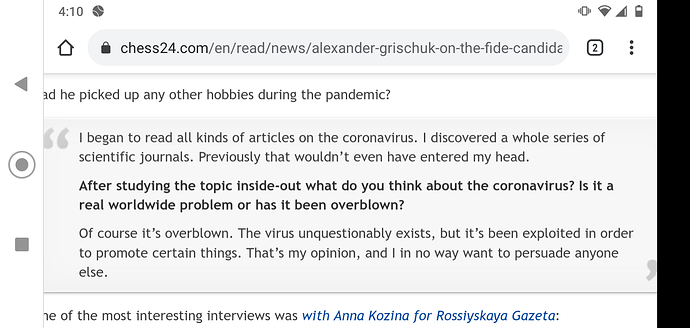Wow. 10x viewers any other online match. Sad.
Cheating at chess netted him $7k plus whatever the exposure might be worth 
Those matches are actually pretty instructional along the lines of “look at what a good player does vs. what a mediocre player does”. It’s actually pretty educational for a beginner.
GMs are possibly the single best example of how being elite at one intellectual activity in no way means your opinions on other matters are meaningful.
Anyone watching Candidates? Obviously watching Hess and Rensch (with Anand dropping by later) on chess.com instead of the gross other commentator sets.
Def recommend the Guess The ELO series, pretty funny at times.
Also
Being good at solving chess positions with fixed variables doesn’t automatically translate to being good at analyzing the real world with its limited information and thousands of possible variables to consider.
In the grand scheme of things it ended up being an overreaction. Wasn’t what 2x normal even?
I agree with your point of course but a lot of people think about things differently. Especially people capable of being GM’s.
He was trying to say it’s a game of complete information whereas having opinions on other matters often isn’t, but fucked it up because he doesn’t understand just how complex chess is.
Yeah, life is technically a game of complete information too. Doesn’t matter.
“Complete information” doesn’t mean that something is simpler or easier to accomplish - as in a chess player’s rating wont increase when you tell them so. Being good at solving chess positions does translate to analyzing things more accurately in the real world as the opposite often is. Humans can’t quantify “the real world” because it’s just so much more complicated then chess, calculators could handle it. They don’t know how.
The distinction between games of complete and incomplete information is useful in game theory where usually one requires a pure strategy and the other requires a mixed strategy. I am not sure that the distinction is useful when assessing an individual’s ability to solve problems, or come up with said strategies.
As someone who’s failed since the K v K days to understand what’s going on in any elite chess games without a GM explaining it to me like a 5 year old they look exactly the same but slower.
Nah the games in classical do tend to be more cautious and more drawish, although Candidates is not the worst for this as it’s winner-take-all, so just drawing every game is guaranteed to not be good enough.
Candidates is also the time when people uncork some really nasty opening prep, like in Caruana v MVL, and that’s kind of fun too, if you’re into it.
I just tuned into today’s games, no spoilers but Giri currently has a substantial but not winning advantage over Ding Liren. I’ve been guilty in the past of doing the meme thing about how Giri always draws, but he has been playing really impressive chess this tournament imo. I don’t remember the games from the first half but Giri’s win over Wang Hao was the game of this half of the tournament I think. Some people might nominate Caruana v MVL for amazing opening prep, or Nepo v Alekseenko for how thoroughly Nepo punhised Alekseenko’s mistake, but Giri’s was the classiest win I think, just gradually overwhelming an opponent who made no really clear mistakes.
Speaking of opening prep, I’ve started building a repertoire on ChessTempo, it’s pretty good imo, it will test you on parts of your repertoire, like it plays the opposing moves and you have to remember your prep. It’s helping me nail down lines I’m a bit hazy on.
I really like Dubov’s commentary on the FIDE channel, he’s just playing around in real time. Gives you an insight into how the GMs are thinking when examining positions.
Lol same here. I do find that opening prep does condition me to always have key principles in mind though so still probably worth it.
If you’re playing short time controls it’s an advantage just to be able to recite moves for a little while rather than needing to stop and think.
Also one of the nice things about building your own repertoire is that you can figure out how to cope with the non-standard moves that you see a lot. For example when I play the Vienna 1. e4 e5 2. Nc3 one move I see quite a lot is d6. It’s a weird move because normally the point of the Philidor after 2. Nf3 is that you’re defending your e-pawn. Against the Vienna it just voluntarily blocks the bishop. I used to play f4 there but wasn’t getting very good positions, so I looked at it with an engine and figured out that the best thing to do is just enter the Philidor with Nf3 and d4, so that’s what I do now. You won’t find that in any opening textbooks, just something I had to come up with to meet a move I saw a lot.
